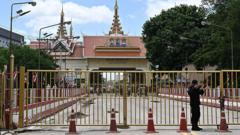Thailand has taken a stern stance against travel to Cambodia amid rising tensions resulting from a prolonged border dispute. The Thai government announced a complete restriction on all individuals and vehicles attempting to cross into Cambodia from various checkpoints, significantly affecting tourism and travel to the popular Cambodian destination of Siem Reap.
The military government, citing concerns over national security, has justified these restrictions as a necessary response to the current climate of hostility. The catalyst for this drastic action can be traced back to violent confrontations along the border in May, which led to the death of a Cambodian soldier, igniting a series of retaliatory measures from both nations.
In response, Cambodia has instituted its own bans on imports from Thailand, affecting a wide array of goods, including fruits, vegetables, and even Thai entertainment. While the travel ban is comprehensive, exceptions are being made on humanitarian grounds for individuals needing medical attention or educational pursuits, subject to checkpoint officials' discretion.
Thai Prime Minister Paetongtarn Shinawatra has publicly committed to combatting illegal activities linked to scam operations prevalent in Cambodia. This includes proposals to disable internet services utilized by Cambodian security forces involved in these operations. The travel restrictions extend beyond land checkpoints, impacting flights from Thailand to Cambodia's resort regions.
The political ramifications of this border conflict have reportedly weakened Paetongtarn's government, following a controversial phone call with Cambodia's former Prime Minister Hun Sen. Criticisms emerged regarding her informal approach in the conversation, with accusations that it undermined Thailand's military influence in diplomatic relations.
Historical grievances trace back more than a century when colonial borders were drawn, contributing to the persistent tensions between Thailand and Cambodia. This latest chapter in their relationship highlights the enduring complexities in Southeast Asian geopolitics and the impact on local communities and tourism.



















